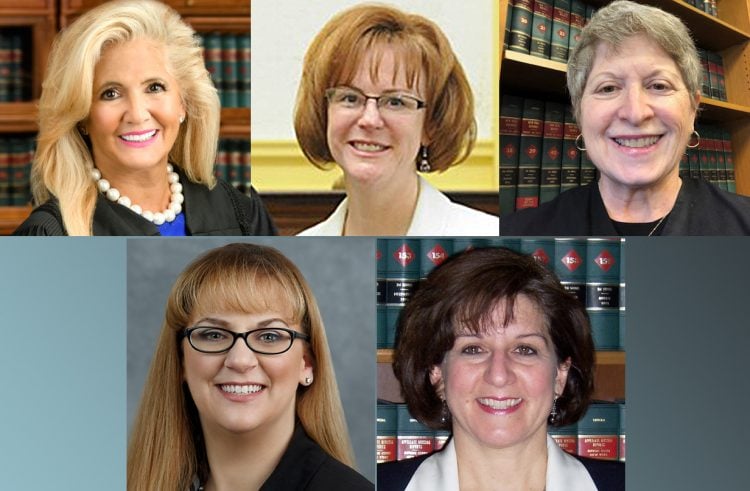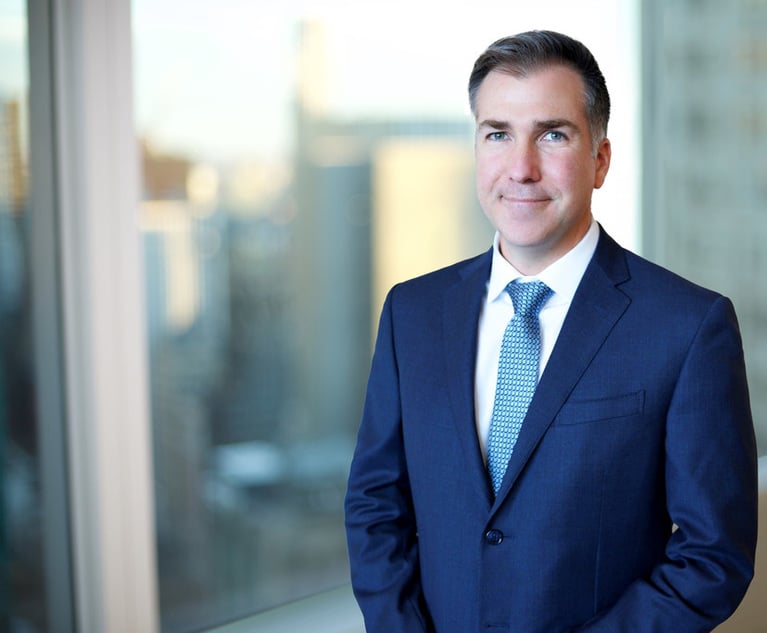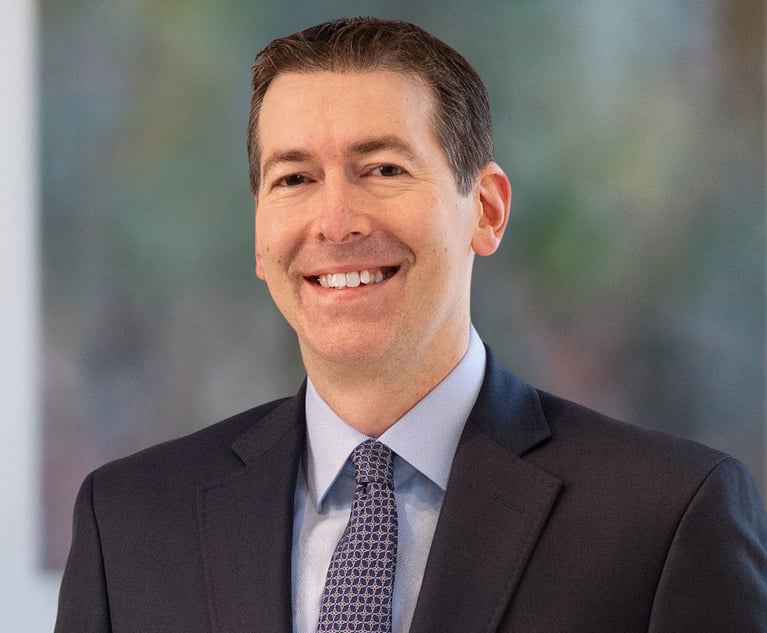Upstate NY's Female Judges Tell Stories of Mistaken Identity, Isolation
Being a female judge in upstate New York is still a rarity. There are 25 mostly rural upstate counties with no female judges in the state's employ and 10 with just one each.
February 13, 2019 at 02:58 PM
5 minute read
 Top row: Justice Bernadette Clark, Judge Julia Brouillette, Judge Kate Rosenthal.
Top row: Justice Bernadette Clark, Judge Julia Brouillette, Judge Kate Rosenthal.
Bottom row: Judge Allison Nelson and Justice Deborah Karalunas. (Courtesy photos)
When Supreme Court Justice Bernadette Clark is in her car, residents will notice the judicial plates and say, “Hi judge.” The only problem is they're talking to her husband.
“From my perspective up here, it's the resistance to even thinking you can run for judge,” the Oneida County jurist said. “They would talk about my hair, my clothes, my makeup, the length of my skirt. I tried to change the conversation. Let's talk about my qualifications.”
Being a female judge in upstate New York is still a rarity. There are 25 mostly rural upstate counties with no female judges in the state's employ and 10 with just one each. That compares to the New York City metropolitan area where nearly 400 of the state's 507 female judges are concentrated, according to state statistics.
Related Story: Cases of Mistaken Identity: Female Judge in NY Told 'I'd Rather Wait for the Judge'
By those standards, Oneida County, with three female judges on the state payroll, is considered progressive. Still, Clark said, she is often treated with disrespect.
“I have one lawyer still to this day who still calls me 'ma'am' although I have asked him to address me as 'judge' or 'your honor,'” she said. “The lawyers in court would say things and act certain ways in my courtroom that they would never think to pull in some of the other judges' courtrooms.”
The same stories were repeated again and again by New York's upstate female judges.
Lawyers agree to appear in front of a female judge but when a male judge later schedules a matter at the same time, they seek an adjournment from her rather than him. They arrive late in a female judge's courtroom or leave early to attend to a proceeding in a male judge's courtroom. They address a female judge in a tone that they'd never use with the male judge down the hall.
“I do often feel that I get the short end of the stick in terms of getting attorneys if they're double-booked and I do feel attorneys very often will double-book more because they feel they can get away with it,” said Family Court Judge Julia Brouillette, who is also in Oneida County.
But, she acknowledges, the discrimination has become less egregious with the passage of time. She points to an experience she had as a young attorney in Texas when appearing in a pants suit in front of an older male judge.
He had her approach the bench. “I'm a judge because I want to see a little leg,” he confided. “And I said 'duly noted.'” The next time she appeared before that judge, she recalls with just a little bit of embarrassment that she wore her shortest skirt, a low-cut blouse and a push-up bra. And, lo and behold, the judge sided with her on all her objections that day.
Syracuse City Court Judge Kate Rosenthal remembers that when she first started as a lawyer the male bar association was having an event and wanted to know whether the female bar association would prepare the food.
Such thinking might be a relic of the past but stereotypes still exist. Sometimes, though, Rosenthal is able to see the humor in the stories she tells.
“The defendant kept calling me 'miss' instead of 'your honor' or 'judge,' which is better than some of the names we get called,” she recalls. “His lawyer leaned over and said, 'It's judge.' And so he said, 'Miss Judge.'”
But she notes that the treatment of female judges and attorneys has improved since her early days.
“I had one Supreme Court judge say, 'Any time I see you it's nothing but trouble. Why don't you stay home in the kitchen?' And I said, 'Judge, have you ever seen me in your kitchen? Believe me, you don't want to see me in your kitchen.'”
Oswego County Family Court Judge Allison Nelson, who is the only female judge on that court, was assigned to represent a client as a young lawyer. “I was the only person there with a suit and briefcase,” she says. “But this judge in front of my client asked me for identification.”
Onondaga Supreme Court Justice Deborah Karalunas said being a female judge can make her feel isolated because she's left out of golf outings and other social events. Lawyers take liberties with her too, she complains.
“I feel that lawyers are sometimes attempting to flirt. Don't tell me 'my hair looks nice today.' Is it horrific? No. It just tells me that we are treated differently,” she says.
But, upon reflection, she doesn't want anyone to feel sorry for her.
“I have met so many, many wonderful lawyers and judges throughout the state, and forged so many, many cherished friendships,” she writes. “And I know that the discrimination I've sustained pales in comparison to that endured by many others in and out of this profession. So I leave you with this: I am truly blessed.”
This content has been archived. It is available through our partners, LexisNexis® and Bloomberg Law.
To view this content, please continue to their sites.
Not a Lexis Subscriber?
Subscribe Now
Not a Bloomberg Law Subscriber?
Subscribe Now
NOT FOR REPRINT
© 2025 ALM Global, LLC, All Rights Reserved. Request academic re-use from www.copyright.com. All other uses, submit a request to [email protected]. For more information visit Asset & Logo Licensing.
You Might Like
View All
Attorneys ‘On the Move’: O’Melveny Hires Former NBA Vice President; MoFo Adds Venture Capital Partner
5 minute read
Orrick Hires Longtime Weil Partner as New Head of Antitrust Litigation

Ephemeral Messaging Going Into 2025: The Messages May Vanish but Not the Preservation Obligations
5 minute read
Trending Stories
- 1South Florida Real Estate Lawyers See More Deals Flow, But Concerns Linger
- 2General Counsel Accused of Destroying Evidence
- 32,000 Docket Entries: Complex South Florida Dispute Sets Precedent
- 4Incoming Howard University Law Professor Kiah Duggins Among DC Plane Crash Victims
- 5Bass Berry & Sims Relocates to Nashville Office Designed to Encourage Collaboration, Inclusion
Who Got The Work
J. Brugh Lower of Gibbons has entered an appearance for industrial equipment supplier Devco Corporation in a pending trademark infringement lawsuit. The suit, accusing the defendant of selling knock-off Graco products, was filed Dec. 18 in New Jersey District Court by Rivkin Radler on behalf of Graco Inc. and Graco Minnesota. The case, assigned to U.S. District Judge Zahid N. Quraishi, is 3:24-cv-11294, Graco Inc. et al v. Devco Corporation.
Who Got The Work
Rebecca Maller-Stein and Kent A. Yalowitz of Arnold & Porter Kaye Scholer have entered their appearances for Hanaco Venture Capital and its executives, Lior Prosor and David Frankel, in a pending securities lawsuit. The action, filed on Dec. 24 in New York Southern District Court by Zell, Aron & Co. on behalf of Goldeneye Advisors, accuses the defendants of negligently and fraudulently managing the plaintiff's $1 million investment. The case, assigned to U.S. District Judge Vernon S. Broderick, is 1:24-cv-09918, Goldeneye Advisors, LLC v. Hanaco Venture Capital, Ltd. et al.
Who Got The Work
Attorneys from A&O Shearman has stepped in as defense counsel for Toronto-Dominion Bank and other defendants in a pending securities class action. The suit, filed Dec. 11 in New York Southern District Court by Bleichmar Fonti & Auld, accuses the defendants of concealing the bank's 'pervasive' deficiencies in regards to its compliance with the Bank Secrecy Act and the quality of its anti-money laundering controls. The case, assigned to U.S. District Judge Arun Subramanian, is 1:24-cv-09445, Gonzalez v. The Toronto-Dominion Bank et al.
Who Got The Work
Crown Castle International, a Pennsylvania company providing shared communications infrastructure, has turned to Luke D. Wolf of Gordon Rees Scully Mansukhani to fend off a pending breach-of-contract lawsuit. The court action, filed Nov. 25 in Michigan Eastern District Court by Hooper Hathaway PC on behalf of The Town Residences LLC, accuses Crown Castle of failing to transfer approximately $30,000 in utility payments from T-Mobile in breach of a roof-top lease and assignment agreement. The case, assigned to U.S. District Judge Susan K. Declercq, is 2:24-cv-13131, The Town Residences LLC v. T-Mobile US, Inc. et al.
Who Got The Work
Wilfred P. Coronato and Daniel M. Schwartz of McCarter & English have stepped in as defense counsel to Electrolux Home Products Inc. in a pending product liability lawsuit. The court action, filed Nov. 26 in New York Eastern District Court by Poulos Lopiccolo PC and Nagel Rice LLP on behalf of David Stern, alleges that the defendant's refrigerators’ drawers and shelving repeatedly break and fall apart within months after purchase. The case, assigned to U.S. District Judge Joan M. Azrack, is 2:24-cv-08204, Stern v. Electrolux Home Products, Inc.
Featured Firms
Law Offices of Gary Martin Hays & Associates, P.C.
(470) 294-1674
Law Offices of Mark E. Salomone
(857) 444-6468
Smith & Hassler
(713) 739-1250






